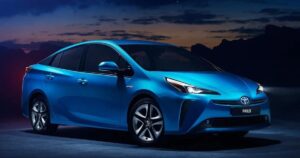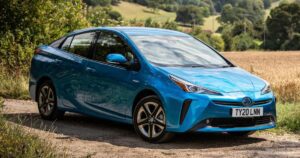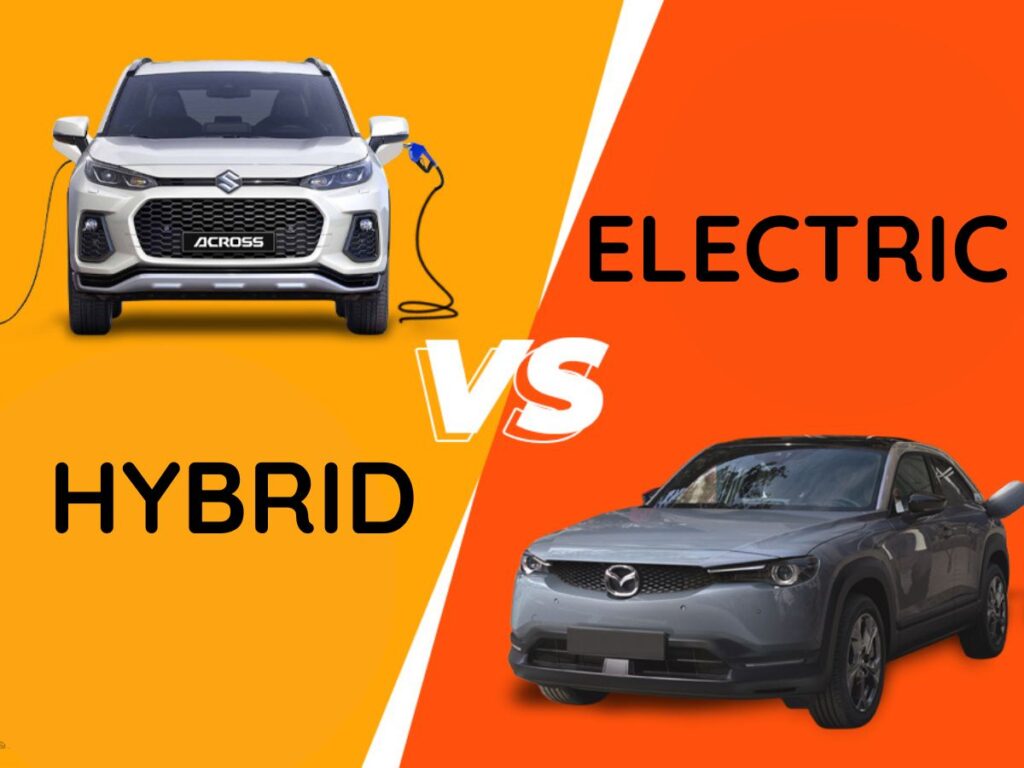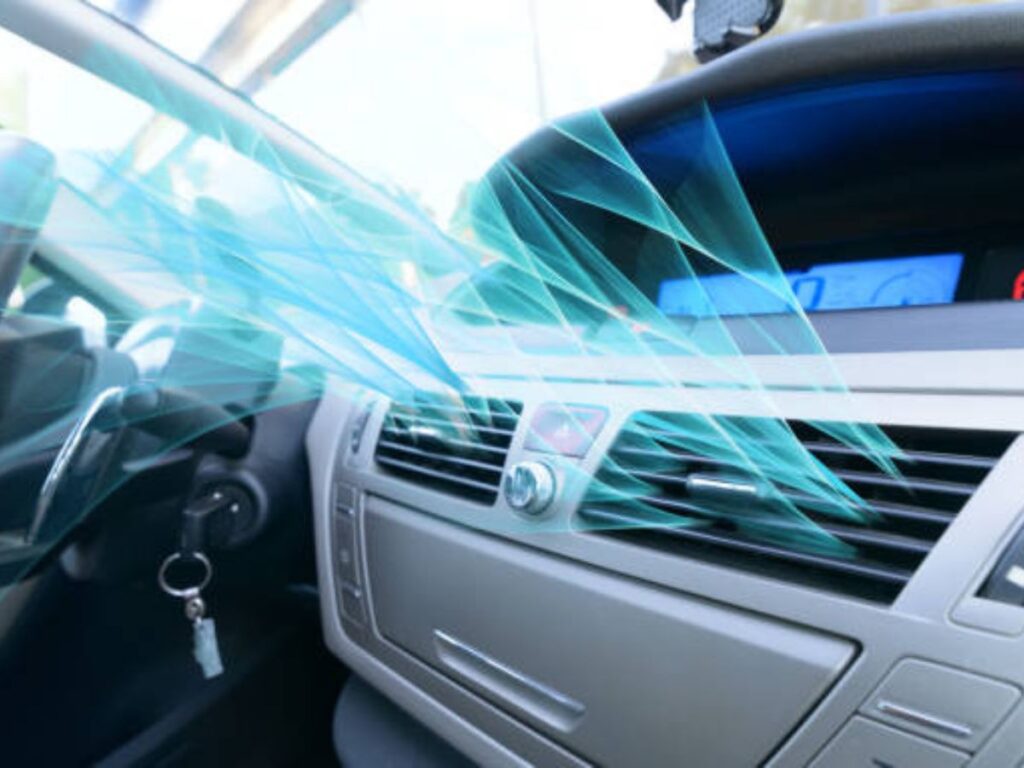Engineers have been developing and selling hybrid vehicles since the late 1800s. However, because they are more expensive to produce in big quantities, they must become more popular on the market. However, automakers are still studying and developing innovative hybrid technology in order to meet stringent pollution rules. But what exactly is a hybrid car? Continue reading to learn more about hybrid Vs. electric cars, their advantages and disadvantages, and how they differ from electric cars.

Table of Contents
ToggleWhat is a Hybrid Car?
Hybrid cars have two engines, one that operates on gasoline and the other on electricity. Both contribute to the wheels turning. This means that less gas is burnt, which improves fuel efficiency.
Hybrid vehicles offer more power and consume less petrol than conventional vehicles because they combine the advantages of low emissions and excellent fuel economy.
When hybrid vehicles maintain a constant speed or slow down, extra power is available to charge the batteries. As a result, the car uses less fuel or travels farther on each tank.
What’s an Electric Car?
Electric cars, often called electric vehicles (EVs), run on electricity rather than traditional internal combustion engines. They propel themselves using one or more electric motors. These motors are driven by rechargeable batteries, which store electricity from various sources, including charging stations and home-based equipment.
Electric vehicles have multiple advantages, including lower greenhouse gas emissions, lower fuel costs, and less reliance on fossil fuels. They help to clean up the environment and can be charged overnight at home for convenience. Electric cars are becoming more popular as a sustainable and efficient means of transportation as technology advances.

Understanding Hybrid vs. Electric Cars
When it come to hybrid vs. electric cars, the differences are instantly apparent. To recharge, your electric vehicle must be plugged in; however, your hybrid model can pull into any gas station.
In contrast to an electric vehicle with a battery and an electrical system, a hybrid automobile still requires maintenance, such as oil changes and engine failure. When it comes to performance, an electric vehicle will be smoother and accelerate faster than a hybrid vehicle.
A hybrid car is still superior to a regular gasoline-powered vehicle but cannot compete with electric power. After knowing the differences between electric and hybrid cars, you may decide it’s worth the extra money to spend on an electric model rather than a plain hybrid.
How To Choose Between a Hybrid and Electric Cars
Even though modern electric vehicles have a more excellent mileage range than their predecessors, these vehicles are still the superior option for motorists who don’t have far they need to travel. When it comes to everyone else, a hybrid car makes it feasible to lessen its impact on the environment while being able to travel further distances.
It is possible for a plug-in hybrid to have a range of between 300 and 400 miles before it has to be recharged, but this will depend on the model that you select. An all-electric automobile can have a range of fewer than fifty miles to just under one hundred, with only the Tesla providing a range of over two hundred and seventy.
This one-of-a-kind lineup also comes with a premium price tag, which pushes many prospective automobile purchasers’ budgets to their limits.
A non-plug-in hybrid will have an all-electric driving range that falls within the scope of 20 to 30 miles, but because of the high mileage, it will typically take you far further on a tank of gas than non-hybrid rivals would be able to transport you. For instance, the predicted city mileage for the 2015 Toyota Prius HB is 54 mpg, while the highway mileage is 50 mpg.

Learn more about: Electric Toyota Cars
Pros and Cons Hybrid vs EV
Hybrid Cars:
Pros:
- Fuel-efficient
- Flexible
- Reliable
- Established
- Cost-effective
- Eco-friendly (partially)
Cons:
- Limited electric range
- Internal combustion engine reliance
- Complexity
- Maintenance costs
- Lesser environmental impact compared to EVs
EV (Electric Vehicle):
Pros:
- Zero emissions
- Long electric range
- Lower operating costs, Simplicity
- Quieter operation
- Strong environmental impact
Cons:
- Limited charging infrastructure
- Higher upfront costs
- Longer charging times
- Range anxiety
- Battery degradation concerns
- Limited model options
Why Are Electric Cars More Expensive Than Hybrids?
One of the biggest problems discouraging potential consumers is the high expense of obtaining a 100% electric vehicle. In most circumstances, the cost of an all-electric vehicle will be more than that of a gasoline, diesel, or plug-in hybrid vehicle. When contrasted, the Hyundai Ioniq Hybrid starts at €28,389, while the all-electric Hyundai Ioniq 5 starts at €45,832; this is a huge price difference.
This is mostly due to the fact that they are manufactured in smaller quantities and employ more advanced technological components. People are still struggling to recoup from the financial losses caused by the pandemic, in addition to the overall rise in the cost of living. Given this, it is predictable that consumers require assistance with the necessary financial transition to an all-electric vehicle.
Even if a person has the financial means to buy a completely electric vehicle, they may be concerned about its driving range due to a lack of supporting infrastructure. Even while governments have committed millions of dollars to increasing and enhancing on-the-go charging terminals, there is still more work to be done. It is safe to state that range anxiety remains a valid problem.
Conclusion
Finally, the decision between Hybrid Vs. Electric Cars comes down to personal choices, demands, and infrastructure availability. Hybrid vehicles provide increased fuel efficiency, lower emissions, and range flexibility, but they still use fossil fuels and have a limited electric-only range.
On the other hand, electric cars offer zero-emission driving, lower running costs, and developing charging infrastructure, but they may face setting availability and range anxiety issues. Whether one chooses hybrids for their adaptability or electric automobiles for their emission-free performance, both contribute to a brighter future and sustainable mobility.



